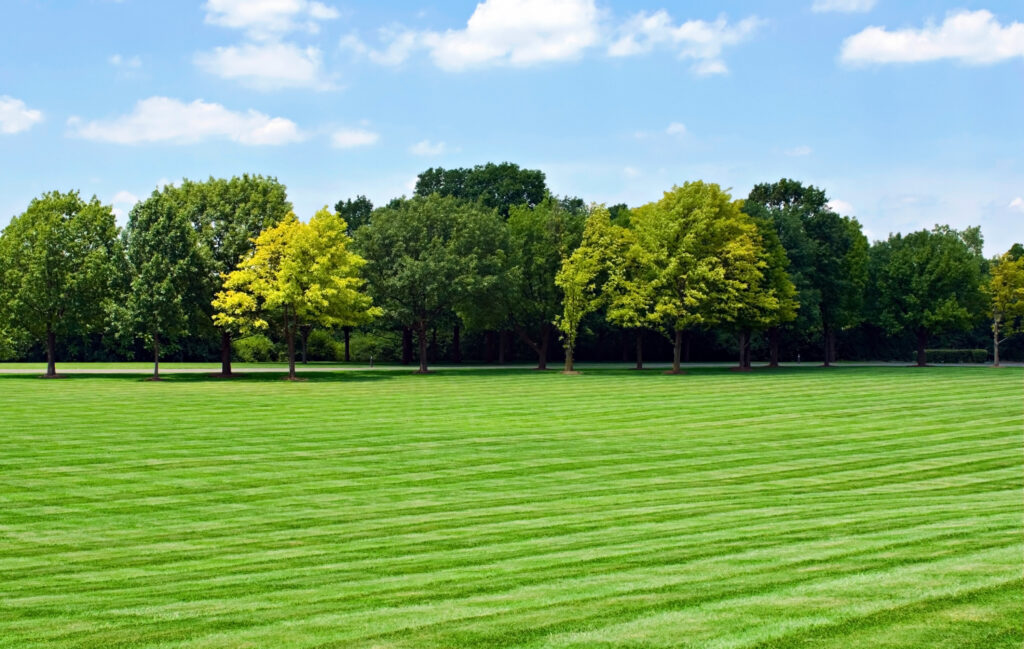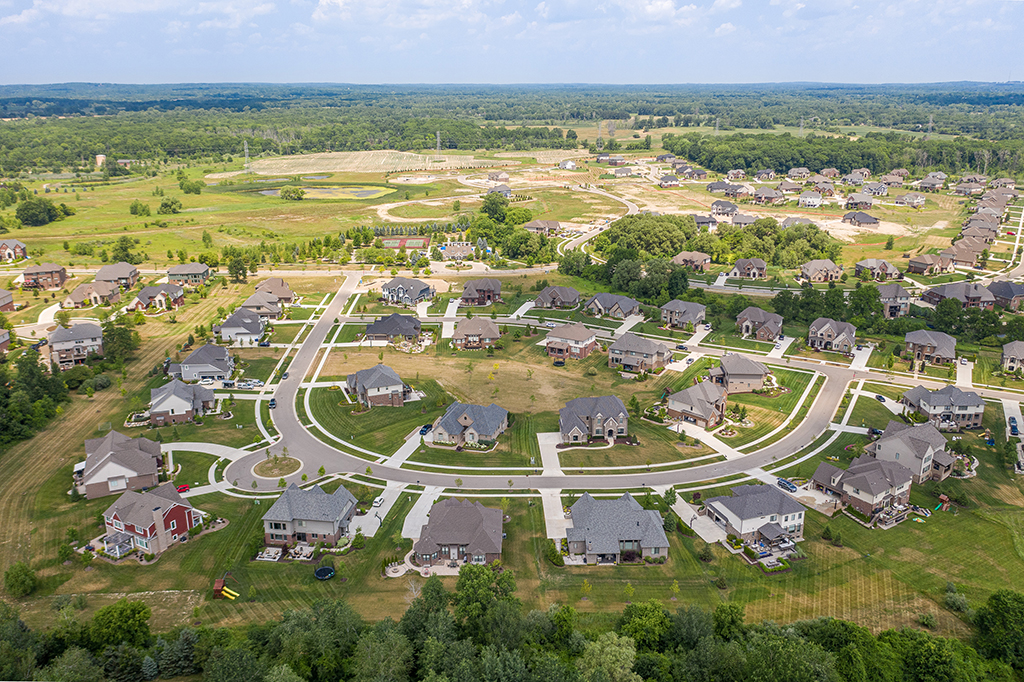
A new, beautiful homesite just went up for sale in the area you’ve always dreamed of living in. It’s the perfect spot to build your new Lombardo home: In a good school district, on acreage, surrounded by trees, and – best of all – within your land budget.
When selecting a homesite, most clients think about its location, size, and price. While those are important, there are other factors to consider, especially in regard to their impact on the overall price of the project. Below, find five questions to ask before buying your own land.
Bringing utilities to a property and connecting to them can add significant cost. It’s important to factor in these costs, especially when you’re considering a larger homesite. There are a few utilities to consider:
If public water and sewer are available at the property, that’s great, but you should look into associated connection fees.
Ensuring a well with sufficient capacity and ensuring soils “perc” for a septic system are crucial issues to resolve before you purchase the land.
Is natural gas available, or will you need to have an on-site propane tank?
In some rural areas, these utilities may not be available at your homesite. You will need to investigate what’s involved in bringing these utilities to your site.
Your homesite may need to have soil hauled in or hauled out. If there is a high water table, it might impact your basement. If the soils are not strong enough to support the weight of your home, you may need to increase footing size or replace existing poor soils with good soils. These are just a handful of items that may arise in relation to the soils on your homesite.
When considering purchasing land for new construction, it’s important to know if there are any environmental hazards that could affect your home or your health once moving in. Environmental hazards can include things like contaminated soil, underground storage tanks, or nearby hazardous waste sites. To ensure the safety of your future home, it’s advisable to do an environmental assessment or hire an environmental professional who can evaluate the land for any potential hazards.
Use rights refer to the legal permissions and restrictions that govern how the land can be used. It’s crucial to understand if there are any specific limitations or rights associated with the property you’re interested in. For example, there may be easements, which grant others the right to access a portion of the land, such as utility companies. By knowing the use rights, you can avoid any surprises or conflicts regarding how you intend to use your land for building your custom home.
Zoning determines the designated purpose and use of the land within a specific area. Each zone has its own set of rules and regulations that dictate what types of structures can be built on the land. It’s essential to inquire about the zoning of the property you’re considering to make sure it aligns with your construction plans. For example, if you’re building a residential home, you’ll want to make sure the land is zoned for residential use and not for industrial or commercial purposes.

Understanding whether the property is located in a flood zone is crucial for many reasons. Living in a flood zone can increase the risk of damage to your home and property during heavy rains or storms. It’s important to check with local authorities or obtain flood zone maps to determine if the land falls within an area prone to flooding. If it does, you might need to take additional precautions or obtain flood insurance to protect your investment and ensure the safety of your future home.
An HOA, or Homeowners Association, is a governing body that enforces rules and regulations for a particular neighborhood or community. If the property you’re interested in is within an HOA, it means you’ll be required to comply with the association’s rules, which can include restrictions on things like exterior home design, landscaping, or the use of certain amenities. Understanding if the land is part of an HOA will help you determine if you’re comfortable with the additional regulations and potential fees associated with living in a managed community.
Property taxes are fees imposed by the local government on property owners to fund public services such as schools, roads, and parks. It’s important to know the annual property tax amount associated with the land you’re considering, as it will impact your annual expenses as a homeowner. Higher property taxes can mean more financial obligations, so it’s important to factor them into your budget and understand how they may change over time.
Back taxes refer to unpaid taxes that may be owed on the land. If the current owner of the land has outstanding tax payments, it can create legal issues or financial burdens for you as the new owner. Before purchasing the land, you should inquire about any back taxes and ensure they’re settled or accounted for. This will help you avoid any unexpected liabilities and ensure a smooth transfer of ownership.
Maybe you fell in love with your homesite because of how wooded the area is, but in addition to clearing trees for your home and driveway, you may also want space for a deck, swimming pool, and backyard. Removing trees from your homesite, whether it’s the bare minimum needed for home construction or more, is something to factor in when selecting your dream homesite. Municipal requirements for tree preservation or tree replacement may impact your overall tree budget.
Once you find your ideal homesite, drive around the area and see what the homes nearby are like. Are the nearby homes and yards well-maintained and free of yard clutter? Are they similar in size and features to the home you’d like to build? As a general rule, you never want to be the largest, nicest home “on the block.” Building a more expensive home than homes in the area may lead to appraisal issues.
Knowing the current use of the property you’re interested in purchasing is important because it helps you understand how the land is currently being utilized. For example, it could be vacant land, agricultural land, or have an existing structure. Understanding the current use will help you determine if it aligns with your intended purpose for the land, such as building a custom home. It can also help you determine the existing utilities on site.

It’s valuable to inquire about any future plans for the area surrounding the land you’re considering. This information can help you anticipate how the neighborhood or community might change in the coming years. Future plans could include new developments, infrastructure projects, or zoning changes. Being aware of these plans allows you to assess whether they align with your vision for your custom home or if they may negatively impact the value or livability of the property.
Deed restrictions are limitations or rules that are legally binding and control how the property can be used or developed. These restrictions are typically outlined in the deed or other legal documents associated with the property. Examples of deed restrictions might include restrictions on architectural style, building height, or the types of businesses allowed on the property. It’s important to be aware of any deed restrictions that may exist, since they can affect your ability to construct your custom home according to your preferences.
Understanding why the land is for sale can provide valuable insights into the property’s history and any potential issues. The seller’s reason for selling could be personal, such as a desire to downsize or relocate, or it could be related to the land itself, such as financial difficulties or a change in plans. By knowing why the land is for sale, you can make a more informed decision and potentially negotiate a better deal. However, it’s important to conduct due diligence to ensure there are no undisclosed problems with the land.
Conservation easements are legal agreements that limit the development or use of land to protect its natural, scenic, or cultural features. These easements are often established to preserve important ecological or historical resources. It’s important to inquire whether the land you’re considering has any conservation easements, as they can impact your ability to develop or change the property. Additionally, it’s worth checking if there are any nearby conservation easements, as they can influence the character and surroundings of the area you’ll be living in.
The driveway location will determine the orientation of the home. The length of the driveway is something to consider, too – a longer driveway requires more concrete. On a homesite with a lot of grade (or hills), a steep driveway may be needed which may not be what you envisioned, especially in winter.
Building on your own homesite can be an amazing experience. This option allows you to build the home of your dreams on the homesite of your dreams, with little or no compromise. However, as you venture into buying your own homesite, it’s important to understand homesite related items that may arise before you sign on the dotted line. This will ensure a comfortable, budget-friendly build process.
Have you already found the perfect homesite for your dream home? Contact us to learn more about Anywhere Lombardo, where we build on your own land in Michigan and Missouri!